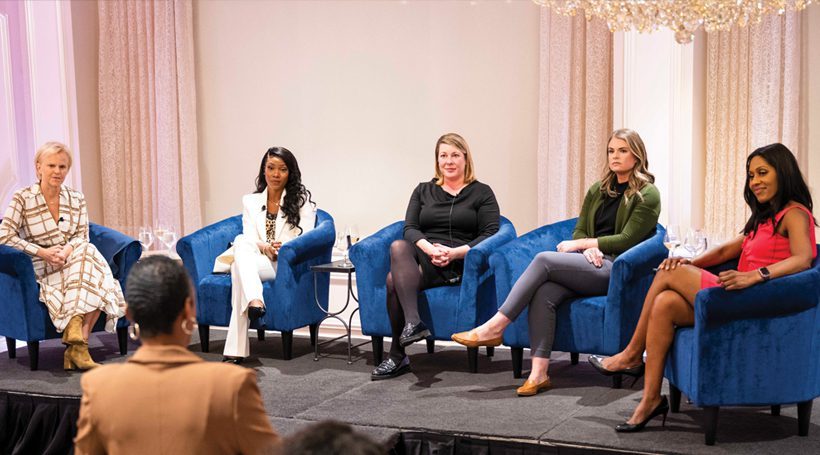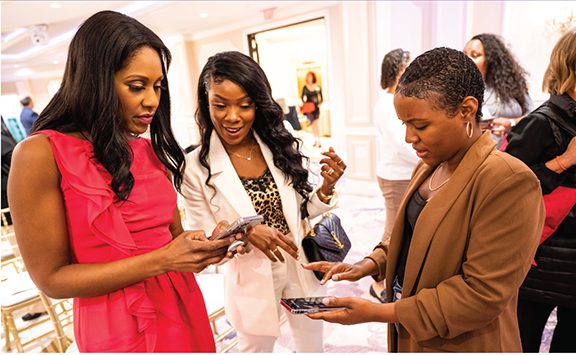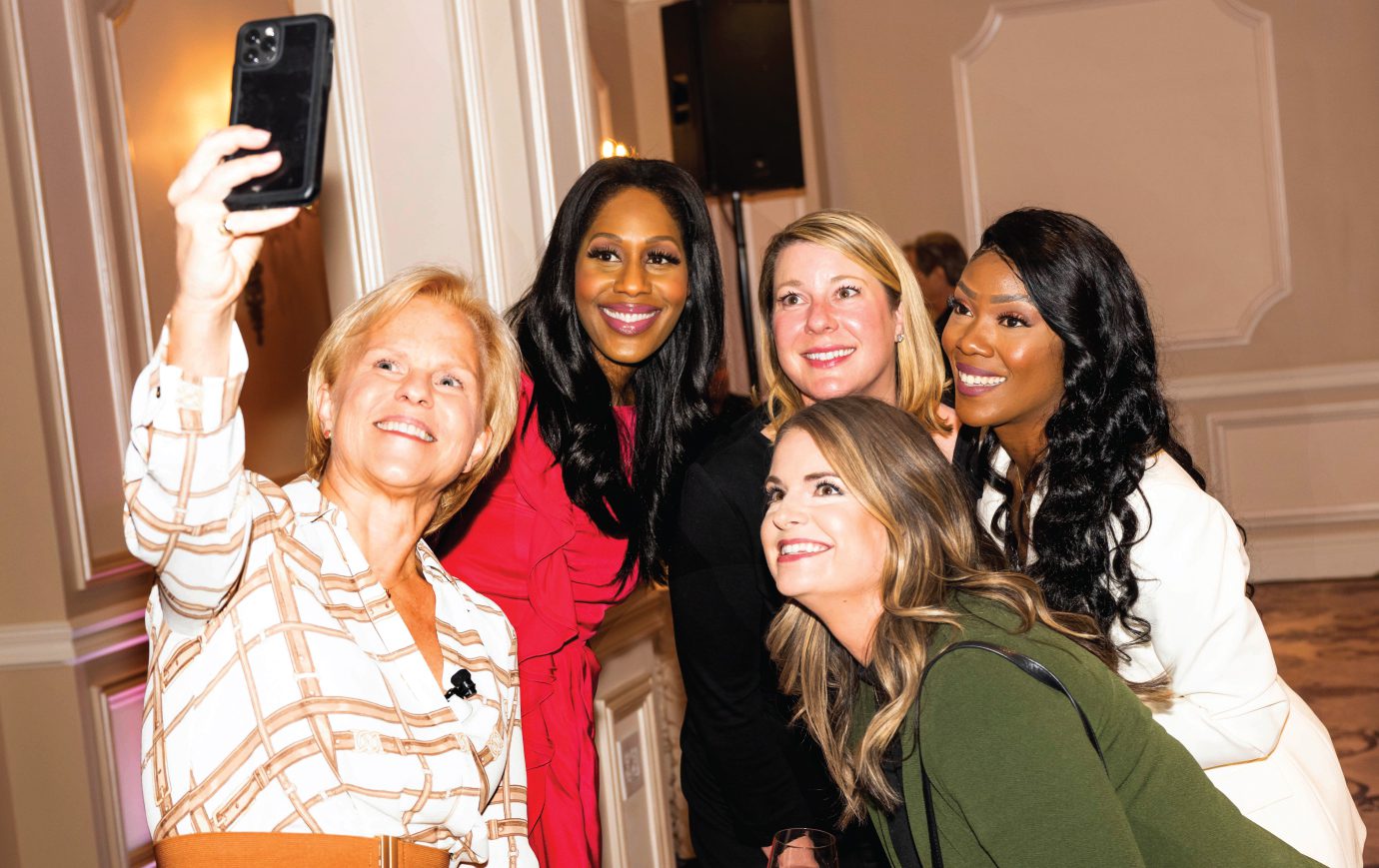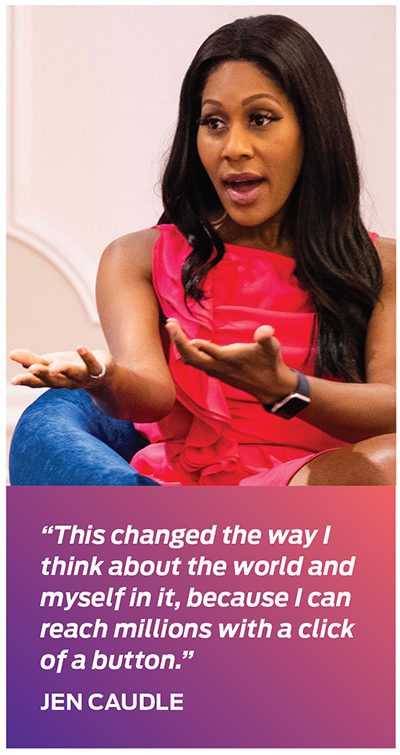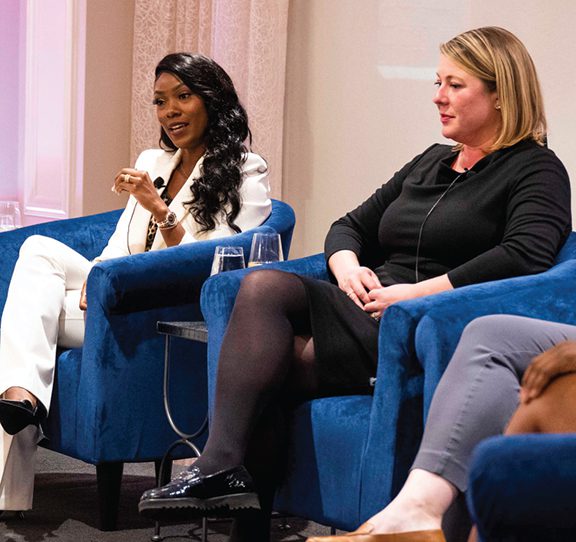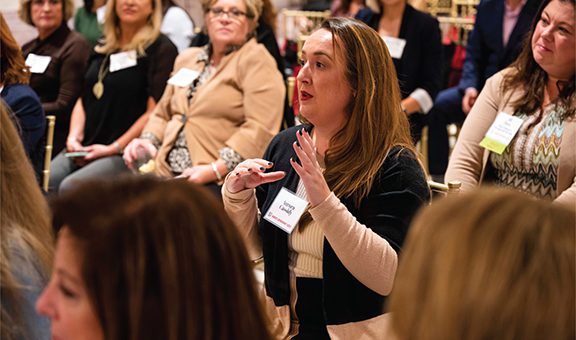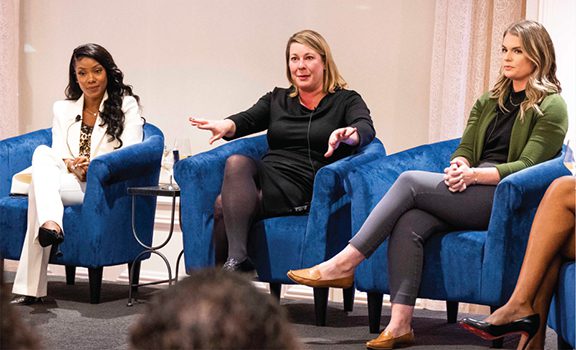The 2022 Women’s Empowerment Series got off to a great start with a deep-dive into social media. Four content creators – each with their own unique platform and each with tens of thousands of followers – joined us to discuss how you can conquer social media. After sharing their personal stories of social success, it was clear that while creating content may look easy when you’re scrolling your feed, it actually takes strategy, planning and non-stop work.
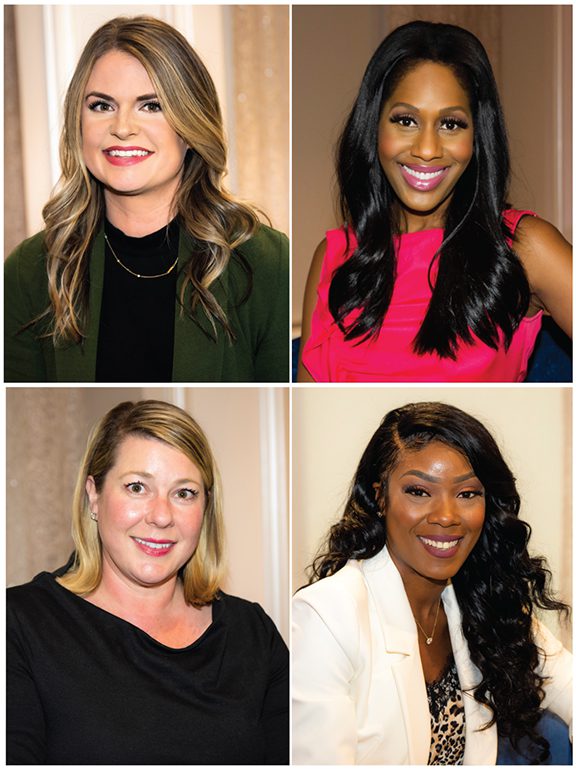
Panelists
Kayleigh Summers
@thebirthtrauma_mama
TikTok: 408,000 followers, Instagram: 140,000 followers
Dr. Jen Caudle
@drjencaudle
Family Physician, Rowan Medicine
Facebook: 407,000 followers, YouTube: 55,700 subscribers
Jen Kavanagh
Senior VP, Marketing & Media The Philadelphia Eagles
Eagles followers on: Twitter – 3.6M, Instagram – 2.3M, Facebook – 3.1M
Emmalyn Love
Love @emmalynlove_
Instagram: 98,400 followers’ YouTube: 28,400 subscribers
Moderator
Marianne Aleardi
Publisher & Editor-in-Chief SJ Magazine
How they blew up on social media
It just kind of happened. I like getting dressed and sharing fashion tips. I share a lot of affordable fashion. I’d post outfits from Walmart, and people were like, “Walmart has nice clothes?” I would buy a blazer and then post a video on 10 ways to wear a blazer. People found value in that, so they started following me. But I didn’t think it was going to turn into a fulltime business. But I now do this fulltime.
Emmalyn Love
I didn’t plan to use social media. I’ve done a lot of TV – that was always number-one for me, in addition to being a physician. But during the pandemic, people had questions about basic things. I started posting videos on things like, does Lysol kill coronavirus? And they went viral on Facebook, into the millions. That’s what got me into social media, and I’ve actually shifted more to social media, because I reach more people than I ever did on TV. It blows my mind.
Jen Caudle
I survived a birth trauma, and when I was 6 months postpartum and finally out of the cloud of the trauma, I woke up and thought, no one’s talking about this. So I started sharing my own lived experience. It didn’t take off right away – I had probably 1,000 followers for a year. When I started educating on birth trauma, birth trauma recovery and pregnancy trauma, that’s when it started to have more of a grip. People were seeing themselves in the content I was delivering.
Kayleigh Summers
The Algorithm
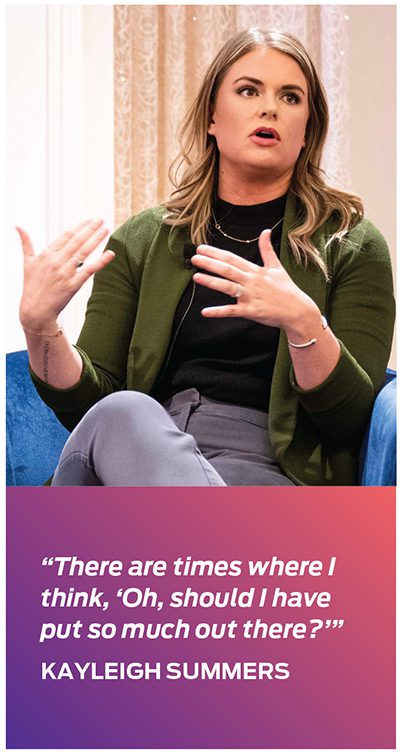 I had a chance to have a call with a rep from Instagram. I wanted to ask the hard question: Why does the algorithm hate us? She said you have to be consistent. You should have a schedule, so if it’s every Wednesday at 5pm, that’s when you post. Not Tuesday at 3 and then Thursday at 6. You can’t be all over the place. Having a schedule helps the algorithm figure out, ok, at 5 pm Emmalyn is going to post. Then they’ll push your content.
I had a chance to have a call with a rep from Instagram. I wanted to ask the hard question: Why does the algorithm hate us? She said you have to be consistent. You should have a schedule, so if it’s every Wednesday at 5pm, that’s when you post. Not Tuesday at 3 and then Thursday at 6. You can’t be all over the place. Having a schedule helps the algorithm figure out, ok, at 5 pm Emmalyn is going to post. Then they’ll push your content.
Emmalyn Love
Utilizing all features on a platform is really important, because the algorithm changes in accordance with the priorities of the platform. Right now everybody’s trying to compete with TikTok because it has such a huge share of market. So Instagram is putting more value into creating reels. YouTube wants you to create YouTube shorts. Using those features that align with the priority of the platform, along with a really good engagement approach, will give you the best outcome. But those rules change over time.
Jen Kavanagh
Initial engagement is what often dictates how well a post does. Within a certain period of time after you post, the algorithm looks to see how many people like it, share it, put an emoji with a comment. Because if people are doing lots of stuff, the algorithm will show it to more people. If your post was buried, and you’re thinking, did anybody see this? Chances are, the initial engagement was low.
Jen Caudle
Monetizing their social accounts
It’s a little easier for me because everybody’s buying clothes. Big brands will have a new fall collection coming out so they’ll say let’s give it to Emmalynn to do some videos. I started working with Ann Taylor and Nordstrom. It depends on your niche. Like if you’re doing food, a restaurant may reach out.
Emmalyn Love
You’re definitely able to make money when you have eyeballs looking at your content. I didn’t know that in the beginning. It’s amazing.
Jen Caudle
Social media has become so sophisticated and very personal. We are able to integrate brands into our content, which is what brands want.
Jen Kavanagh
I barely monetize to be completely honest. I think that’s a big misconception. People see you have a lot of followers, and they think you must make so much money. I work fulltime as a therapist. My goal was really to just talk about my experience. And I would get comments like, “Oh my God, how are you inside my brain? That’s exactly how I’m feeling right now.” That’s what kept me going. But not many companies want to sponsor traumatic birth.
Kayleigh Summers
How they engage with followers
This is a rule of thumb: You don’t post and ghost. You don’t post a photo and then go on with your day. You have to stay on for that first one hour after you post, and engage. When people comment, “Oh I love that dress,” I reply, “Thank you. Here’s where I got it from.” Then I go on other creators’ pages and engage with them. For that first one hour, you want the algorithm to think people liked your post. That’s when they’ll show it to more people.
Emmalyn Love
I have hired someone to spend an hour a day engaging with posts. And I probably spend an extra hour and a half sitting on my couch watching TV and just liking comments. It tells the algorithm this is important.
Jen Caudle
On setting boundaries
Every time I post I feel I’m being vulnerable. As a therapist, I’m somewhat used to that. But there are times where I think, “Oh, should I have put so much out there? Did I make the right call?” I did pull back on how much I share about my child. I still share pictures of him every now and then, but I’ve devised boundaries that feel better to me about sharing my story rather than what I believe is his story in our whole birth process.
Kayleigh Summers
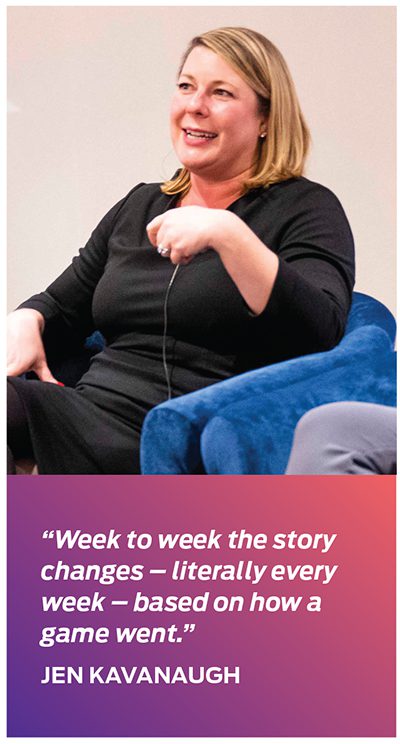 What we put out there needs to match who we are as an organization and what our brand standards are. We live in this area of competition, and we are consistently trying to stay connected to our fans, who are passionate and don’t mince words. So sometimes we have to draw the line. There have been a couple of times where a meme we shared was maybe a little too – mean. So we have a lot of conversations to understand where those lines are, because we love memes. But we have to think about what that looks like and not go too far.
What we put out there needs to match who we are as an organization and what our brand standards are. We live in this area of competition, and we are consistently trying to stay connected to our fans, who are passionate and don’t mince words. So sometimes we have to draw the line. There have been a couple of times where a meme we shared was maybe a little too – mean. So we have a lot of conversations to understand where those lines are, because we love memes. But we have to think about what that looks like and not go too far.
Jen Kavanagh
I’m very protective of my son. I don’t share a lot with him. Most people don’t even know I have a kid. He didn’t ask to be on this platform, so I’m very careful about what I share.
Emmalyn Love
Negative Comments
I don’t want to encourage that on my page. It should be all positive. If you come here and you’re negative, you’re not welcome here. You get blocked.
Emmalyn Love
Everyone has experienced on some level how all content is politicized in some way. We’re dealing with how to address that. It’s an interesting phenomenon. But we definitely delete comments and block people. We will not allow any sort of hate speech, racism or homophobia.
Jen Kavanagh
I let them keep talking. It increases engagement. I’ve talked a lot about Covid, so in that space, the vitriol is tremendous. But I don’t block people unless they are racist, anti-semitic or homophobic.
Jen Caudle
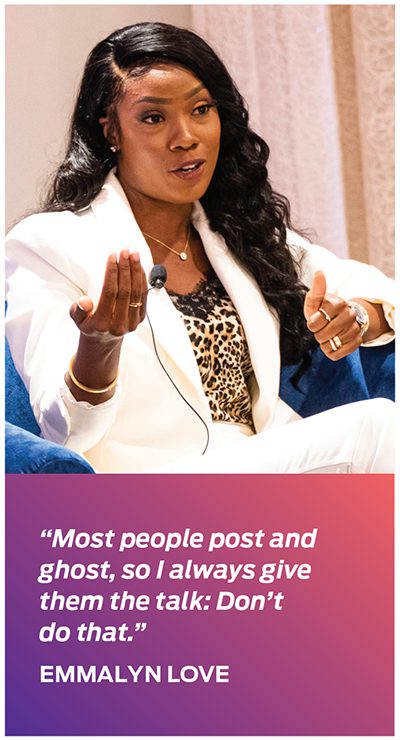 So many of my negative comments are from people, often older generations, who have experienced birth trauma and haven’t gotten the support and validation and treatment they deserve. So their comments are: “Why are you talking about this? Just move on.” “Pull up your big girl pants and get on with your life.” Those do not bother me at all. Where I will delete a comment is when someone says, “You’re going to ruin your child by talking about this.” There’s a boundary around me as a mom versus my birth story. I also get a lot of pregnant women saying, “I’m pregnant and you’re terrifying me. Why would you share this?” And my response is, “I know it’s scary, but I believe everyone deserves knowledge. We need to have these conversations.”
So many of my negative comments are from people, often older generations, who have experienced birth trauma and haven’t gotten the support and validation and treatment they deserve. So their comments are: “Why are you talking about this? Just move on.” “Pull up your big girl pants and get on with your life.” Those do not bother me at all. Where I will delete a comment is when someone says, “You’re going to ruin your child by talking about this.” There’s a boundary around me as a mom versus my birth story. I also get a lot of pregnant women saying, “I’m pregnant and you’re terrifying me. Why would you share this?” And my response is, “I know it’s scary, but I believe everyone deserves knowledge. We need to have these conversations.”
Kayleigh Summers
Coming up with content
It’s a lot of work. You have to be consistent. You have to keep telling your story over and over until you reach the people you want it to reach. You have to come up with a plan, you have to come up with a schedule, and you have to stay on top of it.
Emmalyn Love
I have learned who I want to be by following other people and seeing what they post. I scroll in the morning to see what’s resonating, to see what health issues people are talking about. I consume social media. That’s how I get a lot of inspiration.
Jen Caudle
I don’t plan my content in advance, which is crazy. But I do post at the same exact time – I always post in the evenings. I also repurpose content every 3 months. It’s the only way to survive. I’ll turn static posts into a reel or change some words and use the same caption.
Kayleigh Summers
It’s very difficult, especially as an individual creator, to come up with new ideas. But look at what’s trending, then see if you have a way in or a point of view on that. Look at the Zeitgeist and see if there is an opportunity for you to join the conversation.
Jen Kavanagh
At the Eagles
Jen Kavanaugh gave us some inside scoop on the social media team at the Eagles.
We work very closely with players to provide content for them. After a big game or a big play, they are so fast to text my social manager, “Hey, you got a picture of me?” And yes, absolutely we do. So post game, their individual highlights come from us.
We have 6 people on the social media team. We’ve learned a good strategic approach to organizing that team is to have individuals who are dedicated to each platform.
We have a few buckets: The x’s and o’s, where you show highlights. Then it’s helmets-off content, which is showcasing the players in a lifestyle setting. Telling more of the individual player’s story has become really important to us. And then we look for opportunities to tell stories about our brand that connects with younger audiences – and those stories may not even be about football. So if you’re a member of Gen Z, a professional sports team may not be as important to you as it was to prior generations. But you could learn that we are one of the most sustainable stadiums in the country, and we have a green mission that is superior to many other organizations. That becomes the connection point: We care about the environment, you care about the environment. That’s how we become your team.
We have a TikTok manager role posted for the first time. We’ve probably gotten over 1000 resumes.
Don’t miss our next panel
Women’s Empowerment Series Panel 3: I’m not Superwoman: Is having it all even a thing anymore?
When: Tuesday, December 6, 6 – 8 pm
Where: The Mansion on Main Street, Voorhees
Join us for a night of food, drinks, networking and a panel by women in South Jersey at the top of their fields. This panel will feature:
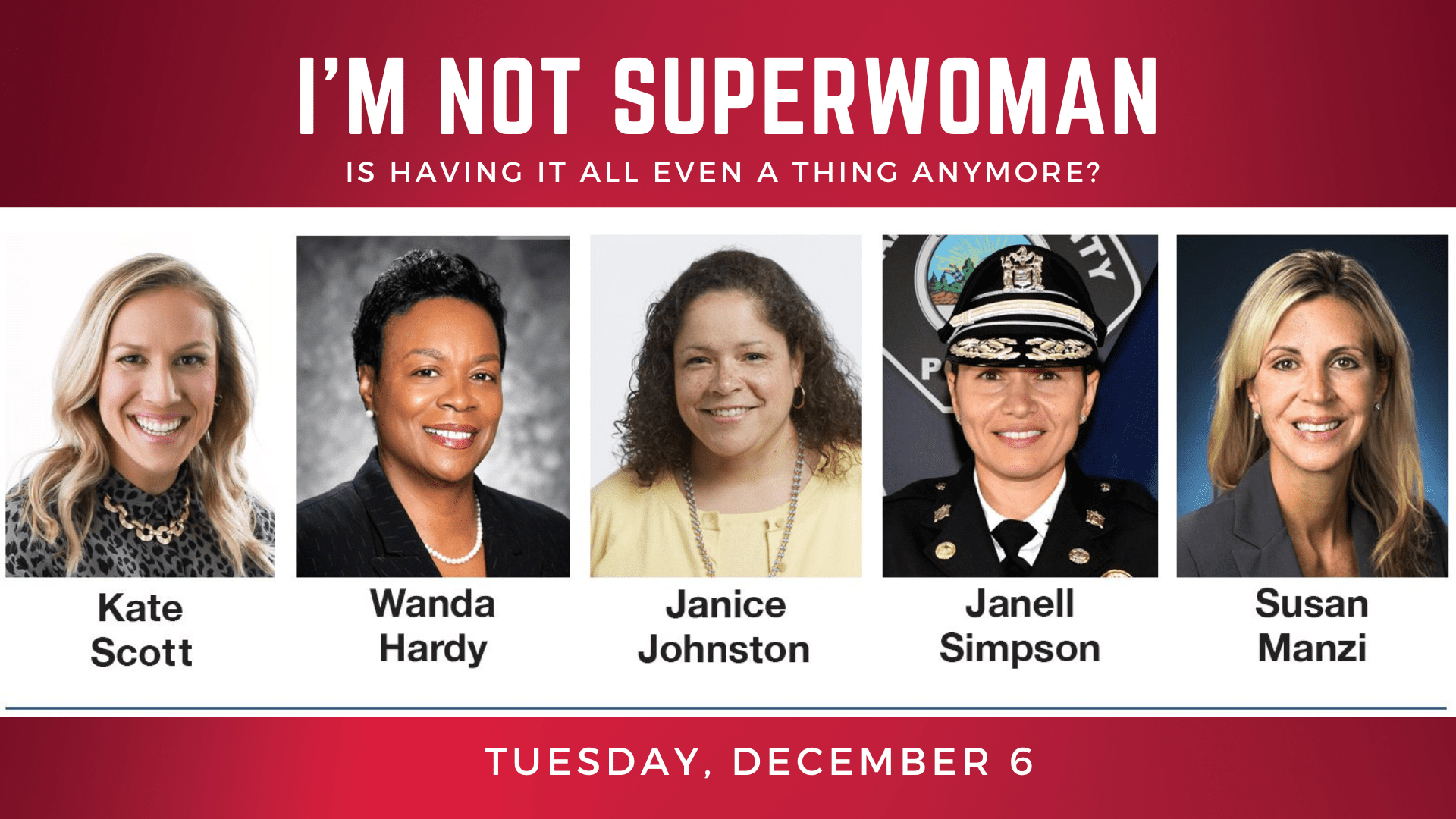
Kate Scott Play-By-Play Announcer, Sixers
Wanda Hardy President/CEO, Financial Wellness Institute
Janice Johnston Executive Producer, ABC’s “20/20”
Janell Simpson Deputy Chief, Camden County Police
Susan Manzi Chief Financial Officer, SJRA


